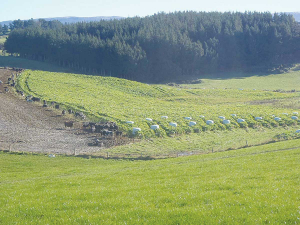The focus on winter grazing practices in Southland revs up this month.
Environment Southland says its staff will be out and about in the region identifying potential winter grazing risks to help farmers prepare for the upcoming season.
Environment Southland, with support from DairyNZ and Beef+Lamb New Zealand, will take a look at cultivated forage crop paddocks from the air and by land, to identify areas that may pose issues for water quality this winter.
The land sustainability team will then follow up directly with those farmers identified with higher-risk paddocks to ensure there is a strategic grazing plan in plae, and to offer advice on managing the issues that could arise from these paddocks.
The council says poor intensive winter grazing practices can cause significant damage to Southland's freshwater quality through sediment and effluent runoff leading to excess nitrogen, phosphorus and bacteria to waterways. It can also affect soil structure and health, and in some cases animal welfare.
Environment Southland chief executive Rob Phillips says he is keen to ensure farmers are supported to be well prepared for winter grazing this season.
"We appreciate the hard work farmers have put in improving their wintering practices over the last few years.
"There is a continued spotlight on Southland farmers' wintering practices so they need to be prepared and vigilant through wintering practices continue to improve."
Flights will focus on identifying winter grazing paddocks that may pose a risk to water quality when animals are grazing.
Staff will also be assessing paddocks from the roadside for potential problems.


















